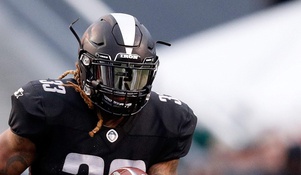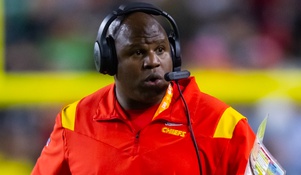Who Fed It And Who Ate It: Week 17, Part 2
Where 12 teams will move on to playoff football, 20 others are left picking up the pieces of what might have been. While players cleaned out their lockers and coaches & executives are facing the music in their respective cities, there were some expected changes... And a big story that may stretch throughout the off-season.
Pittsburgh Steelers wide receiver Antonio Brown was a scratch for their game against the Cincinnati Bengals due to a reported knee injury. But Brown was held out due to an alteration in practice. Now, Brown is asking for a trade and the Steelers are now at a crossroads. The 2018 Pittsburgh Steelers can be summed up in one word: drama. Between RB Le'Veon Bell's year long holdout (and anticipated bitter divorce from the team), QB Ben Roethlisberger's turnover happy throws and harsh public criticism of his offensive teammates, and Brown's previous incidents that entailed Twitter feuds, a civil lawsuit, and high speed joyriding, it's been a surreal season for a franchise that is normally about as controversial as vanilla ice cream. But the week leading up to that crucial Week 17 match-up against the Bengals finally hit the limit. According to accounts, Brown became upset that Roethlisberger either asked him or told him to re-run a route, apparently taking umbrage with his quarterback's analysis. Brown threw a football in anger at Roethlisberger, then stormed off the practice facility. Brown was absent for the balance of the week, then was inexplicably placed on the injury report for a knee injury all of a sudden. On Sunday, he was inactive, ostensibly due to that knee. However, after the Steelers were eliminated from playoff contention, the story regarding Brown came out. Shortly afterwards, Brown requested that he be traded. Now, general manager Kevin Colbert has an unenviable decision to make: Keep Brown and hope both the player and the team can peacefully coexist for at least one more year, or move the highly talented but troublesome wideout., be it via trade or by outright release. This becomes very tricky because of Brown's contract. He has $21 million that the Steelers must account for. Cutting him at the beginning of the league year (around the first of March) would equate to $1 million in salary cap savings, but a $21 million dead money cap hit. And if either a trade develops or the Steelers cut Brown after June 1st, Pittsburgh would split that hit over two years: $7 million in 2019, then $14 million in 2020. While this affair is truly an exception to the rule, it's instances like this that cause a chasm between players and team management. Players, especially those who are among the best of their contemporaries, look for not only top line salary, but long term security. Management must work within the framework of the salary cap and the resources of the franchise itself. They look to build a team that can contend for championships consistently while spending as little money as possible while fulfilling parameters in the league's Collective Bargaining Agreement. The X factor is the uneven tiers of the salaries of each position, as each position is paid different for many reasons. When one of those elite players, in terms of both talent and pay, becomes a liability to their franchise, it can make team executives uneasy on making long contracts with their star players. But when it comes to the very best, teams will pony up the jack. And if Bell has wondered why the Steelers never signed him to an extension, it's because they feared what has happened with Brown: a disruptive episode that threatens to unravel the fabric of the entire roster. This saga will be front and center at every noteworthy date on the NFL off-season calendar.
Black Monday took six head coaches out, and add the two in-season dismissals, that means one quarter of the NFL will be looking for new sideline leaders. While your humble scribe blanches at the notion of the quick trigger on many coaches, fans want blood when seasons go awry and management is under pressure to produce. Here are the six recently unemployed:
1. Steve Wilks, Arizona It is rare that a head coach gets sacked after only a singular campaign. What is puzzling is that it is plainly evident that the Cards were beginning a rebuild, and an abysmal season was all but a certainty. Granted, Arizona posted a bad 3-13 record, but it that all on Wilks? The next hire will shed more light on the true state of their roster.
2. Vance Joseph, Denver Bronco fans have been screaming for Joseph's head on a pike since last season, and seeing the fact that Joseph posted Denver's first consecutive losing seasons in nearly 50 years, the writing was on the wall. Executive vice president of football operations John Elway has booted on Joseph and the heir to Peyton Manning, two decisions that are among the most critical for a franchise who find themselves in a very competitive division. We'll see if Elway can right the ship with his next hire.
3. Todd Bowles, New York Jets Yes, Bowles' last three years have been losing seasons, and the buck does stop with him. But GM Mike Maccagnan did him no favors, as Bowles had serviceable quarterbacks at best and dealt with rosters that were always short on talent. If Gotham Green's next head coach doesn't improve beyond Bowles' body of work, expect Maccagnan to walk the plank next. Bowles, meanwhile, will more than likely land on his feet as a defensive coordinator elsewhere, and he can soak the Jets for the balance of his contract if he doesn't like his options.
4. Dirk Koetter, Tampa Bay Koetter's job was twofold: Build the Buccaneers into a winner and mold QB Jameis Winston into a franchise level player. The result was a 19-29 overall record with no playoff qualifications and Winston not much different than what he was as a collegian. Perhaps this was karma; Koetter was promoted to the head coaching position from the offensive coordinator's post under previous head coach Lovie Smith. But it could also be on him, as the Bucs was left wanting for leadership on the field. Whoever is the next head coach, they will need to make a relatively quick decision on Winston's fate in central Florida.
5. Adam Gase, Miami When Gase was hired, he was to turn QB Ryan Tannehill into a elite passer and invigorate the Dolphins' offense, a unit that has been dormant for the better part of a decade. As we leave 2018, Gase is fired, Tannehill is almost assured that he will be on a different team next year, and the offense is still woefully anemic. Part of the blame falls on recently terminated football operations executive Mike Tannenbaum, who made big splashes in free agency, but stripped away future cap space while bringing in players who were more concerned with their individual goals than becoming leaders on the team. General manager Chris Grier now has full control over personnel matters, and he will have his work cut out for him in finding a new coach that will come in and not feel that he is stuck with whatever comes from up high. Part of Grier's sales pitch will be about culture change, no question.
6. Marvin Lewis, Cincinnati After a 16 year run, Lewis and Bengals owner Mike Brown have decided to part ways. Lewis leaves one of the more complicated legacies for a head coach in this era. When he took over in 2003, Cincinnati was a laughingstock, forever branded the Bungles after a decade plus run of futility. Three years in, the Bengals win their division for the first time in over 15 years, but then lose in the Wild Card game at home. While Lewis put up a decent 131-122-3 regular season record overall, the record that will haunt his career is 0-7, his overall playoff record, along with one of the most incredible in game meltdowns in NFL postseason history in 2015. Some believe that Lewis should have been dismissed many years ago, under the guise of the team reaching its zenith with him at the helm. Bengal fans get their wish, and it was time for Cincinnati to move on. It will remain to be seen if the long time head coach will be seen in a different light as the years go by, but Lewis did show that long coaching tenures can happen in today's NFL without multiple Super Bowl titles to ensure it. It would improve the NFL product if coaches weren't as disposable as diapers, but good luck asking fans, executives, and owners to be patient.





